Ketogenic diets
Ketogenic diets have some benefits over others, particularly for the obese as they address satiety where so many of the rest usually fail; you won't feel constantly famished.
Those of you who follow this site with any regularity will know that I am dismissive of dieting in general; researchers evaluating the whole gamut found that a year later only five-percent of folk had lost a significant amount of weight and around a half had actually added pounds.
Allow plenty of time to peruse this page on ketogenic diets; this is not one to be rushed. There is much to ponder; it could completely change your life. Rather come back to it later than try to skim it in five minutes.
"There is little support for the notion that diets lead to lasting weight-loss or health benefits.
We concluded most would have been better off not going on them at all."
- Prof Traci Mann, U of Minn, Health and Eating lab[1]
If it is not sustainable don't even bother starting; a complete waste of time and effort. Could you give up bread for ever, do you really need to and is there an alternative? Yes, there is.
There is one interesting proviso though. Most of this work was done on caloric-restriction diets. They leave us constantly famished, with hormonal signals to the brain chanting "eat, feed and snack."
Stop counting calories; it's a complete waste of time.
Is there such a thing as a plan that does not restrict calories? Yes, there is.
Ketogenic
- Less than 25% of calories from carbs.
- More than 45% of calories from fat.
- 30% of calories from protein.
There is a huge variation in what might be considered a keto diet. Some suggest limiting calories from carbs to 10%; with that from fat as high as 80 percent.
The liver produces ketones, a source of energy, in the absence of glucose; from ingested and stored adipose. It is a normal metabolic process in which the body burns fat when there is insufficient carbohydrate for fuel.
It is called gluconeogenesis; protein too may be used to produce ketones.
More fat and protein
Those meal plans that push us towards ketosis by profoundly restricting all carbs but increasing energy-dense foods do succeed. More fats and proteins but where should they come from?
Then the body burns fat and protein for energy; gout is a potential side-effect if it all comes from meat. That should immediately raise certain questions.
Diabetics
This is profoundly good for diabetics as blood-glucose drops, often dramatically. Medication must be reduced immediately and so strict ketogenic diets should only be followed under the direction of your doctor; you could go into a coma. Insulin is often halved within days.
- What is a fasting blood sugar level for a diabetic?
- Repeated loss and gain of weight causes permanent kidney damage in 40% of diabetics.
This means restricting starches; whole-grains, legumes and refined carbohydrates. The good, the bad and the ugly must all come under the hammer.
In order to go into ketosis the glycogen in the liver must be used up; this can only be achieved by extreme lowering of all carbs from our food.
And cutting out not only sugar and flour but also legumes, many vegetables and fruits too because of their starch-content.
Within three months pancreatic beta-cell function can be restored[10].
Whole grains and legumes
Only for a season, whole grains and legumes must also be
severely limited; they are both profoundly important in the bigger
picture. Sugar and refined carbs must go for ever; they are what are
literally killing us; they are the causes of the chronic degenerative diseases.
Fats are encouraged, particularly those of animal-origin; butter, cream and that from meat. Blood cholesterol may rise, sometimes dramatically.
"In a typical ketogenic diet plan, about 5 percent of calories are derived from carbohydrates, 20pc from protein and 75% from fat.
That means that if you intend to consume 2,000 calories a day, you’ll have about 167 grams of fat, 100 g of protein and only 25 of carbohydrates.
For reference, one apple contains 25 grams of carbohydrate."
- Save Our Bones
Banting
Banting was first used by the celebrated medical doctor William Harvey when he treated a "morbidly obese" London undertaker.
He was also a William; with the surname Banting.
Carbohydrate was severely restricted; William Banting lost so much weight that Harvey reportedly did not recognise him when he returned for a follow-up consultation six months later.
There are three-levels of banting.
- Less than 50g of carbohydrate per day.
- 20 grams.
- 2 grams.
The latter under 2g is extremely difficult and only for epileptic children who respond to no medical treatment.
Eating less than 20g of carb is difficult for those used to enjoying bread, rice and legumes like green-peas; and colas and cookies too. It is for unstable diabetics who are not responding well to conventional medical treatment.
Less than 50g of starch per day is also difficult but a very effective way for the obese like William Banting to lose a lot of weight.
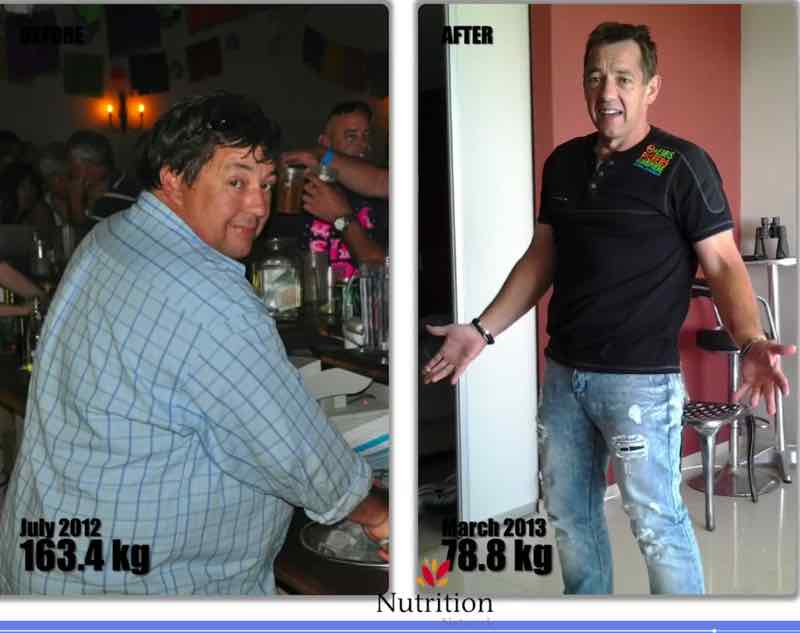
Banting too is a high fat meal plan; the sponsors have now acknowledged that they over-promoted cream and bacon dripping for example, looking currently rather to increased protein as in the Atkins diet.
The proponents of classical banting still gainsay legumes and whole grains because of their carbohydrate content; both are strongly associated with greater well-being. There are concerns whether this is a sensible way to lose weight; perhaps for a season.
Paleo
The Paleo diet recommends that we should be enjoying meal plans using foods from the era beginning about two and a half million years ago; before grains and legumes were readily available. Rather, it makes more sense proponents say genetically that we should be following the ways of the hunter-gatherers; meat, fish and vegetables. They would also have fed on nuts and seeds if and when they were found.
Paleo is an effective way of losing weight but scientists have the same concerns about the absence of whole-grains and legumes. Too much protein is being obtained from meat.
Whilst the WHO is recommending that we limit red meat, probably a cause of neoplasms, Stone-Age man would not have eaten that from a feedlot, cage or sty as we have to.
It is incredibly difficult to find the wholesome, pasture-fed red meat and unrefined grains that early man readily had access to.
"Eat less saturated fat; that has been the take-home message from the U.S. government for the past 30 years. But while Americans have dutifully reduced the percentage of daily calories from dripping, cream and eggs since 1970, the obesity rate during that time has more than doubled; diabetes has tripled and heart disease is still the country’s biggest killer."
- Scientific American
What is more the excessive polyunsaturated linoleic acid in sunflower and soybean oil has clearly been shown to promote inflammation; in the typical large amounts in the food found in today's grocery stores. It makes up around 10% of energy requirements; and should be no more than 2 percent.
In small amounts, linoleic acid is in fact an essential fat; we cannot be healthy without it. But too much of a good thing is a killer.
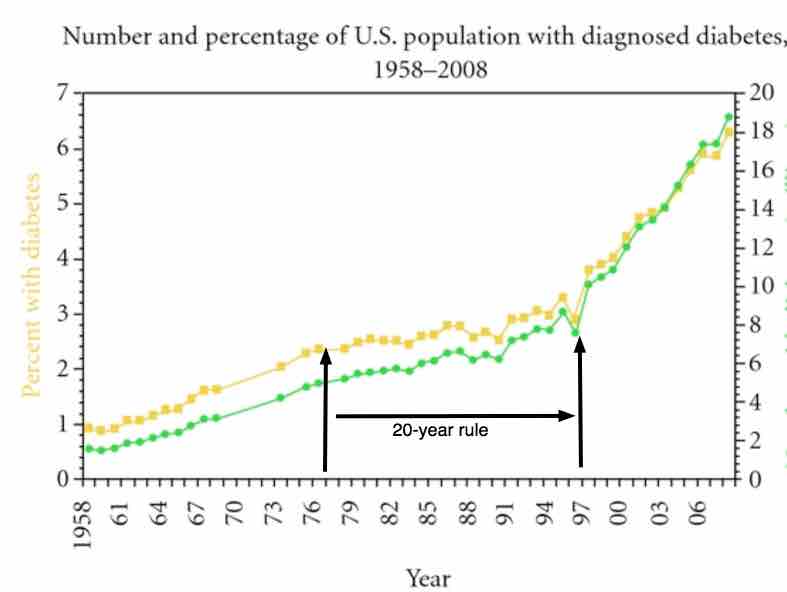
Notice the twenty-year rule; the onset of the massive diabetes spike two decades after changing from fat to a diet high in refined carbohydrate and sugar.
1977 was the year when the McGovern select-committee guidelines were promulgated.
Atkins diet
The much vilified Atkins, going back some 50 years is another of the more successful ketogenic diets. The theme tune remains essentially the same; strictly limit carbs like potatoes and bread, enjoy plenty of protein and don't be anxious about saturated animal-fat.
Despite the contempt of the medical fraternity, researchers have now vindicated Dr Robert Atkins' belief that a moderate amount of animal fat does not raise blood cholesterol; it is the glucose from refined starches and sugar that the liver turns into triglycerides which are public enemy number-one.
Fats and protein provide the satiety, that feeling of fullness, that we all crave; no need to snack at 11 o'clock.
"Do not eat any refined-carbs, period."
Dr Atkins
Flexitarian diet
The Flexitarian diet is basically that of a vegetarian with occasional days when you might enjoy meat, fish or fowl. How often is not defined; it's up to you. Since whole grains and legumes are not restricted the carbohydrate content of meals would not be very low, and followers would probably not go into ketosis.
"You'll find out that the keto diet, for example, if you do it with animal fats as opposed to those from plants, is associated with a high mortality, particularly if you have had a heart attack in the past."
- Dr Kim Williams, Chief of Cardiology, Rush University Medical Center
Nevertheless those following the Flexitarian way of eating are less likely to be enjoying refined carbohydrates, mitigating against obesity and type 2 diabetes. It is nutritionally-sound and an effective plan for the obese to consider. Weight loss is likely to be slow but sure, rather than dramatic.
How would a typical omnivore become a flexitarian? Simply by cutting out meat one or two days a week, and replacing it with legumes such as peas, beans and lentils. It shares much in common with the longevity diet of Professor Valter Longo.
"When we eat, we are literally constructing our bodies; so it is crucial to focus more on what you include in your diet to help build your tissues, rather than on what you restrict."
- Dr Casey Means
Lectin-free diet
Lectins are proteins found in legumes and whole grains especially but in all plant foods too; they link to carbohydrates and lessen the absorption of minerals. For this reason they are termed anti-nutrients.
Since lectin-free diets would dramatically lower legumes and grains, they reduce carbohydrate consumption and increase animal protein.
Whilst the aim would be different it ends up being not dissimilar to the Atkins diet.
Lectin-free is effective but not considered a healthy way to lose weight since it limits vegetables, legumes and whole grains; nuts and seeds too. There is a mountain of research indicating these are all nutritious, good foods.
Popular guru of this way of eating, Dr Steven Gundry describes the toxic-effect of lectins on our wellness; but then totally ruins his case by saying we can eat all these foods provided we purchase his supplement.
Cholesterol and carbs
No question of it, the obesity pandemic in the US began after Ancel Keys propounded his theory that cholesterol was the cause of heart disease. Follow-up studies have however found that he doctored the figures by selecting only those countries where this appeared to be the case; and striking out any that countered his thesis.
Banerjee et al have in fact proved quite the contrary; saturated-fat from our food is actually associated with lower overall mortality[2].
Following up on Keys' misplaced theory, the McGovern dietary guidelines then advised Americans to raise their carbohydrate consumption (in practice this turned out to be increased refined starch) and lower foods like eggs that are rich in cholesterol.
Within twenty-years Americans started becoming morbidly obese and diabetes spiked; and continues to do so. They are still enamoured with Keys' falsified cholesterol theory despite the facts.
Ketogenic diets go entirely counter to this, strictly lowering carbohydrates and again allowing foods rich in cholesterol; to the ire of the greater part of the medical community.
Artificial sweeteners cause weight gain by disturbing normal neurohormonal mechanisms; they are not a solution.
Double the risk of a heart event
The American College of Cardiology reported in 2023 after following a group of keto dieters for ten years that they had more than double the risk of a new heart event[8]. A great weakness of the study was that it did not take into account whether the fat came from fruits like the olive and avocado; or animals and fish.
See more on this subject lower down where the four distinct keto diets are discussed.
"Although the subjects on the low carb diet ate the most saturated fat, they ended up with the healthiest ratio of HDL to LDL cholesterol and lost twice as much weight as their low-lipid eating counterparts."
- New England Journal of Medicine
The microbiome and obesity
The alimentary canals of all animals contain a myriad of bacteria, viruses and yeasts known as the friendly flora. It's commonly believed by many people that these microscopic creatures are dangerous and must immediately be eradicated with antibiotics; not so, the vast majority are very beneficial.
It is true obviously that sometimes our intestines can be invaded by pathogens; toxic bugs that can make us very sick. Those with a healthy microbiome containing many billions of friendly cells are more likely to survive such an attack without treatment.
The supportive flora will usually outnumber and subdue the pathogens.
These friendly bugs produce very important metabolites that give energy to the lining of the gut and control the immune system; and in this instance how we burn and store fats. They influence how insulin and glucagon work in the body. They feed on the fibre that is not digested in the stomach and small intestine, reaching the colon instead.
Actually the microbiome extends to the skin, armpits and bladder too; and even the eyes.
The unfriendly bacteria provoke inflammation in the body, raise our blood pressure and cause insulin-resistance, for example. Literally, they can make us fat.
The most important thing that we can do to support the friendly bugs that help keep us in shape is to eat more fibre. That means whole unprocessed grains, fruit and vegetables; legumes, nuts and seeds too. This is all completely counter to the ketogenic diets.
Most people today enjoying the so-called "industrial diet" eat less than half of the fibre that is recommended. So it comes as no surprise that they are increasingly obese; unwittingly they are starving the friendly bacteria that help control blood pressure and prevent insulin resistance.
TG/HDL ratio
Lind et al found that those with the highest TG/HDL ratio were significantly more insulin-resistant and had an increased risk of coronary heart disease[3].
Glucose absorbed from the starches we eat, and especially that which is highly-refined, is processed by the liver and turned into TGs; triglycerides.
Those on one of the ketogenic diets that restrict starches will lower the TG/HDL ratio lessening the risk of coronary heart disease; yes, it's totally contradictory. When the scientists come up such divergent views, we have to follow our own instincts.
Why exercise helps so little with weight loss
Researchers have finally got it figured out why exercise contributes so little to weight loss in the obese; the basal energy-expenditure drops by a massive half.
As we exercise all those those "basal" matters, like digestion and even thinking, drop so half the calories burned by our muscles are compensated for. Distressingly the more obese we are the less going walking or swimming contributes to weight loss.
Weight loss research explains some of these issues.
However exercise after starchy and sugary meals certainly helps limit serum glucose.
This healthy diet for prediabetes also discusses new research on how it is best diagnosed; the very simple and inexpensive 1-hour glucose tolerance test.
Exercise is omnipotent for BG control
Cross-training, jogging and cycling may not help much with weight loss but when it comes to blood glucose control medical researcher Dr Christine Joisten, MD claims that "exercise is omnipotent;" it has unlimited power.
These gems from a weight loss conference should be weighed by everyone struggling to lose pounds.
Are you crazy about food? Bernie's no-diet plan.
Having meandered through this page you will know that Bernie is dismissive of all diets. They simply don't work for the majority and leave us famished, depressed and angry.
Diet is a dirty 4-letter word that rarely delivers on its promises.
There is no getting round it though; if you continue consuming foods high in refined carbs you will never win. You cannot drink colas, eat chocolate-cake and expect to lose weight.
Refined carbs have to go for ever, or at least be kept for high and holy days only. This is where the ketogenic diets win.
And don't ever start the shakes; just eat more protein, preferably from legumes. This authentic hummus recipe is our favourite; make it in only five minutes.
- Eat plenty of foods that satiate; they give us that feeling of fullness.
- Enjoy your protein, but do emphasize the legumes like green beans, chickpeas and lentils despite their carbohydrate.
- Don't
be afraid of fat but go light on the polyunsaturates; they are
inflammatory and will give you pain in your joints and muscles. I love
those from fruits, the olive and avocado, in particular, and am partial
to butter and coconut-cream.
- Eat as many coloured-foods as you can. Aim for about ten a day; even a sprig of parsley counts.
- Enjoy plenty of salads and fruit, but limit the load of those with a high glycemic-index; could you make a nutritious smoothie for two with just a quarter of a banana and one teaspoon of natural honey?
- Don't be fearful of butternut and sweet-potatoes, but eat only sourdough bread and new spuds. Consider baking your own loaf.
- Take a short walk after a starchy-meal; it won't help much with the pounds and ounces but it does contribute greatly to lowering blood glucose and improving muscle tone.
More protein for the elderly
Enjoy more protein, from meat in moderation; prodigious quantities of green-beans of various kinds and eggs too. Make large tubs of hummus regularly and eat it daily with salads.
Hummus is usually made from chickpeas but any legume could be used. The sesame seed paste turns it into a complete protein; all the essential amino acids are present.
The longevity research recommends "less but adequate" protein in the middle years, mainly from legumes, nuts and seeds; but more for children and the elderly.
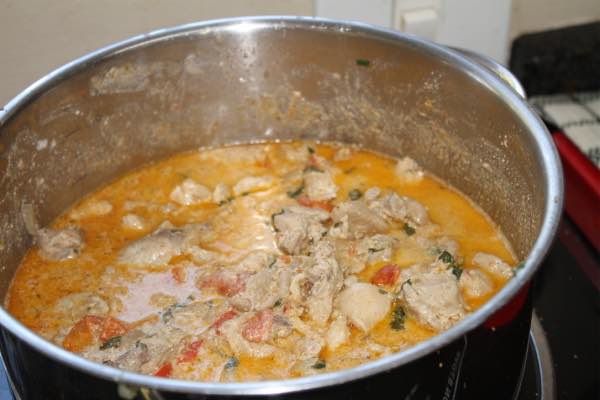
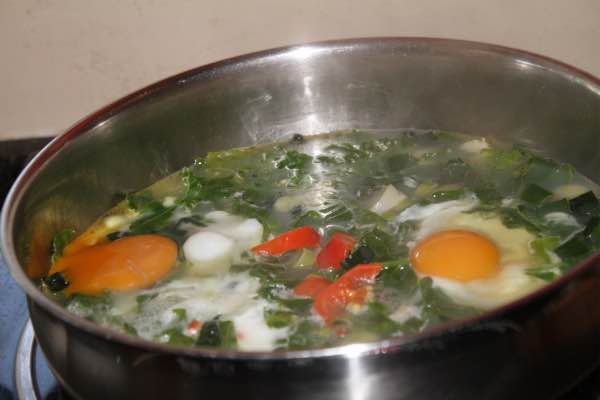
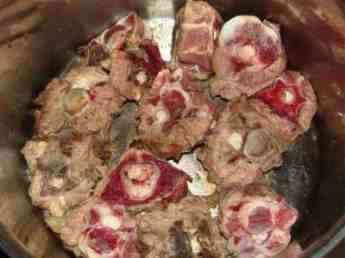
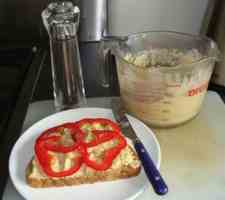
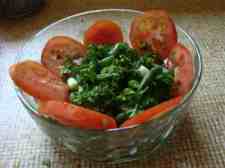
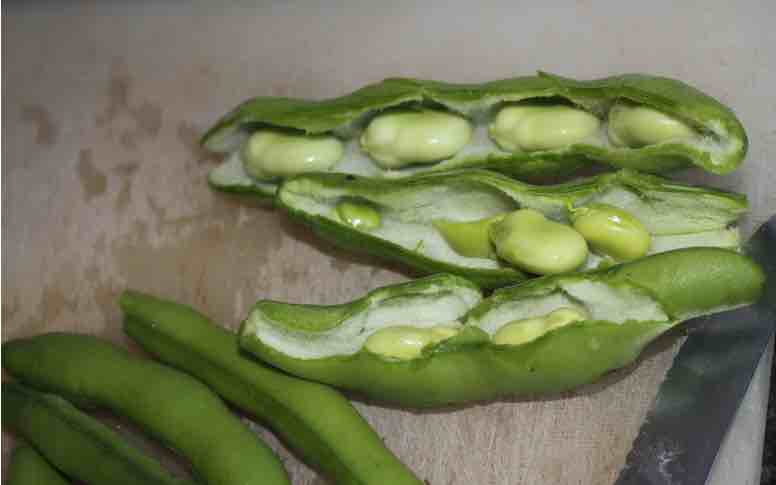
Fats
A moderate increase in fat helps to dispel hunger pangs but get as much as possible from olive oil and avocados. Despite the cholesterol we are not anxious about butter and coconut-cream.
Butter is back and after all should never have been sent to Coventry.
High levels of dietary linoleic acid, an omega-6 fat weakens the intestinal barrier leading to leaky gut syndrome; small amounts are essential to wellness but the industrial diet now contains 5 times the recommended amount; that's inflammatory.
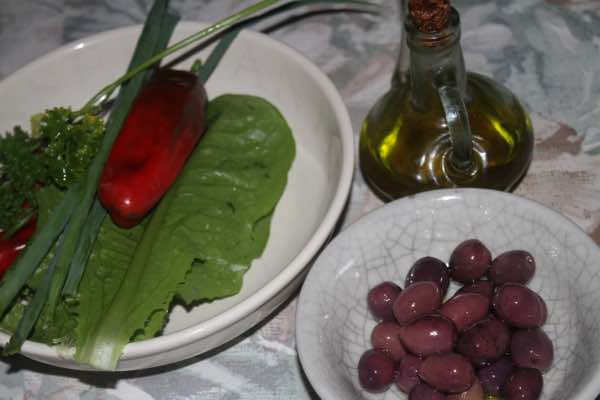
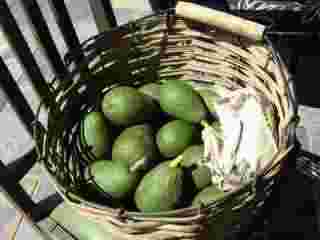
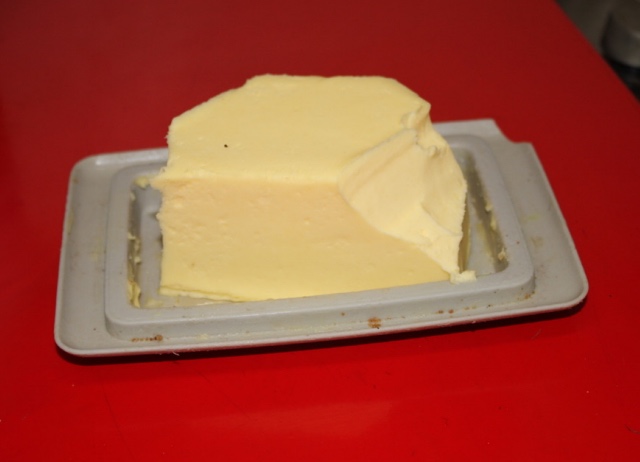
Salads
With a little imagination salads are delicious; and supply us with the many phytonutrients that are absolutely vital for our well-being. Pesto uses nuts for extra protein.
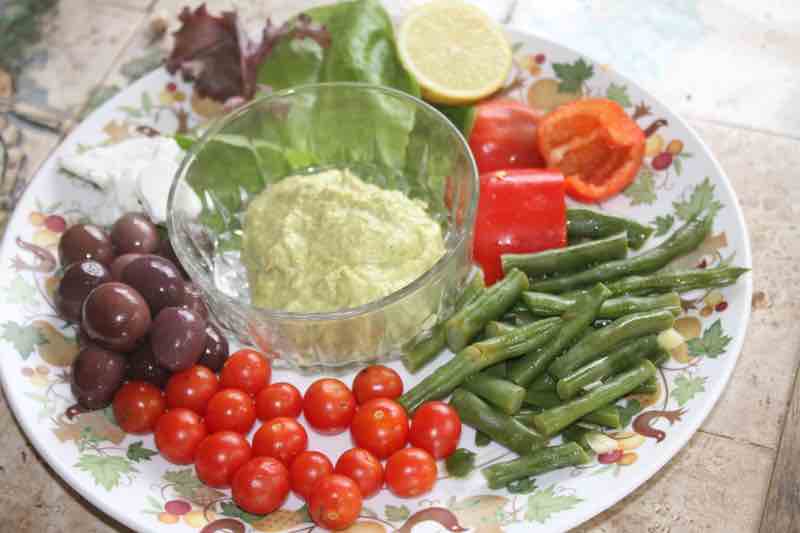
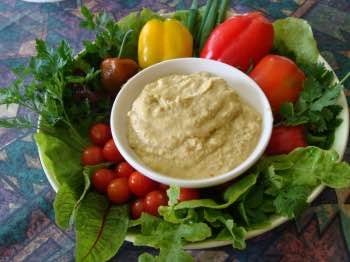
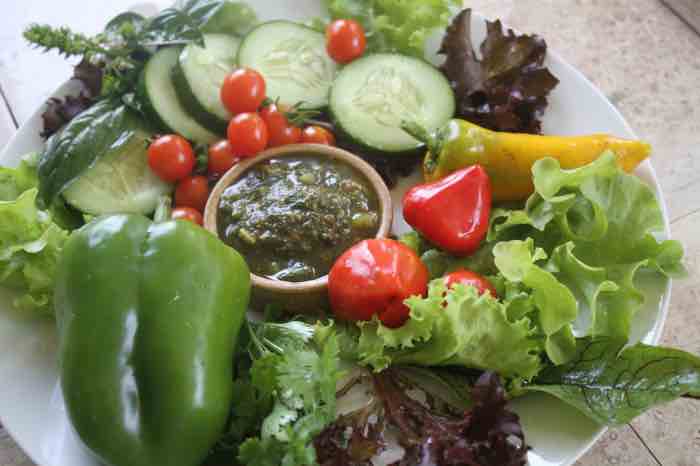
Four distinct keto diets
Researchers have found that the perpetual diet wars between factions promoting a seemingly endless list of different ways of eating have led to substantial public confusion and mistrust in nutrition science[9].
Nowhere is this more true than of the keto diets. Should your food be high in animal fat? Or could you get those lipids from avocados, olives and coconuts?
Must you get the protein from such a lot of meat? What about the research indicating that we should be eating a cup of legumes daily to reduce the risk of cancer?
Don't whole grains like corn on the cob have a very low glycemic index?
These four distinct keto diets outline the different options; some are much healthier than others. The question remains unresearched at this stage whether they are equally effective.
Don't get depressed and distressed; even the best minds in nutrition are unable to agree. My understanding as a Believer is that we should follow the lead of the Spirit. He will lead you into all truth; when He speaks, obey.
Trust and obey, there's no other way.
Medication for weight loss
In desperation after the ketogenic diets have failed to give long term results, many are turning to medication for weight loss.
That is yet another cul de sac; why medication for weight loss doesn't work. Two-thirds of obese people quit within a year.
- Dieting does not work
- The Diet-Heart Hypothesis: Changing Perspectives. Perspectives In Medical Research, 2018. 6(2): p. 4-11.
- Can the Plasma Concentration Ratio of Triglyceride/High-Density Lipoprotein Cholesterol Identify Individuals at High Risk of Cardiovascular Disease During 40-Year Follow-Up? Metabolic syndrome and related disorders, 2018. 16(8): p. 433-439.
- A Systematic Review of Supplements and Alternative Therapies for Weight Loss. Web: https://onlinelibrary.wiley.com/doi/epdf/10.1002/oby.23110
- Plant-based and pescatarian diets and COVID-19 severity
- Lignans and breast tumours
- Energy compensation and adiposity in human
- Popular keto diet may be linked to higher risk of heart disease
- Ultra-Processed Diets Cause Excess Calorie Intake and Weight Gain
- Influence of carbohydrate consumption on pancreatic function
When browsing use right click and "Open Link in New Tab" or you may get a bad gateway signal.
Fruit
Enjoy as many different whole fruits as you can, especially berries and lemons. Limit the load of those with a high glycemic-index; like grapes for example. We have smoothies several times a week.
Absolutely eschew fruit juices like OJ from a carton. It's a very high-carb junk food.
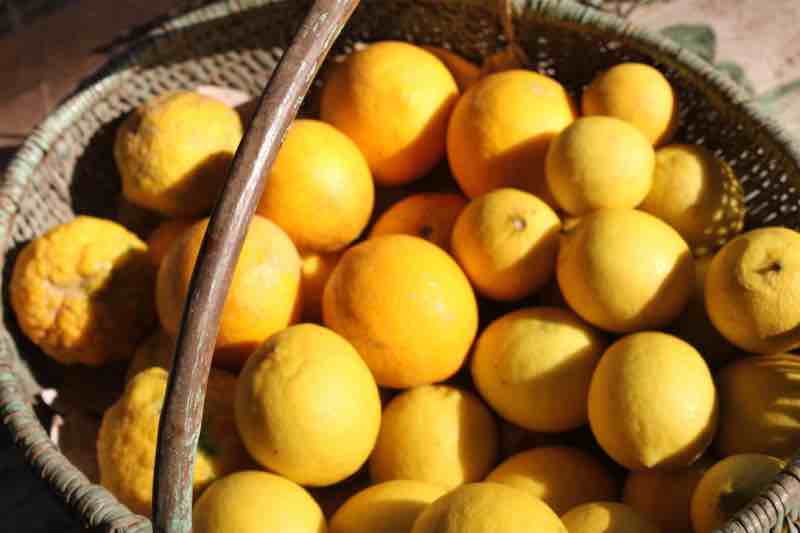
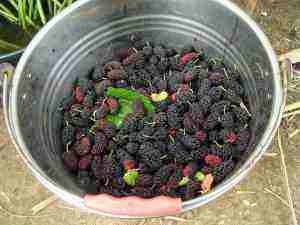
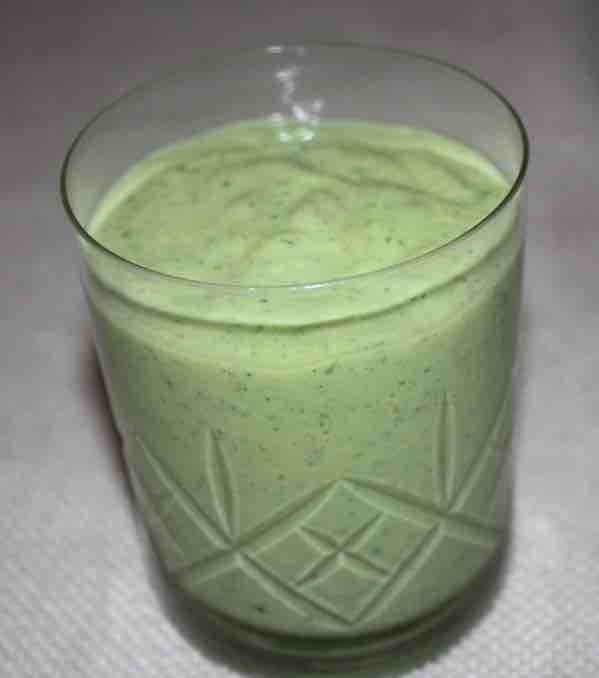
Starches
Commercial loaves all use refined flour. It takes only five-minutes to prepare the sourdough for your own artisan bread every day.
New potatoes have far less starch than those from cold-storage but are very difficult to locate. So we grow our own.
Growing butternut squash is very easy if you have a large garden; we had an astonishing harvest of 150 this year.
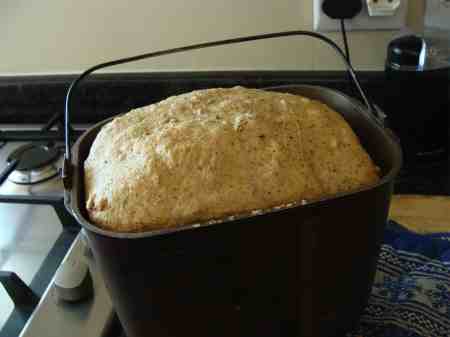
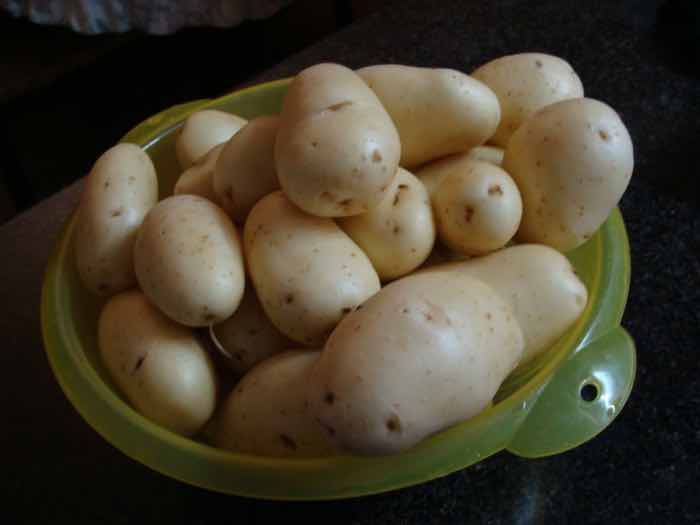

Carbs
There were only two things that were difficult and required some real will-power. Giving up sugar for ever and finding a source of natural honey. That meant for us keeping our own bees.
And giving up all refined flour; that meant kissing commercial bread, cookies and cakes goodbye and, instead, buying a mill, grinding our own flour and baking sourdough. Understanding net carbs was a big step forwards.
For five-minutes work you can bake a loaf of the best-tasting bread in the world for less than half a dollar; rich in fibre, lignans and vitamin E. Prior to the milling of flour heart disease was almost unknown.
Lignans help prevent breast tumours[6]; a must for every woman.
What are lignans is a question we should all be able to give a short answer to; this is not "small beer."
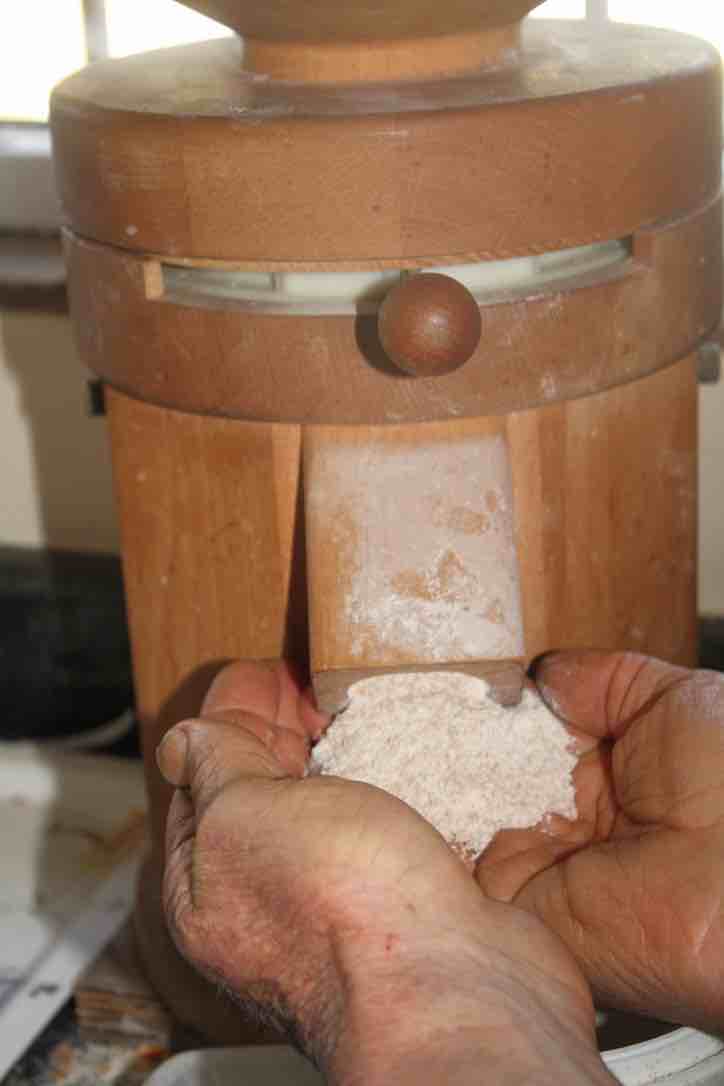
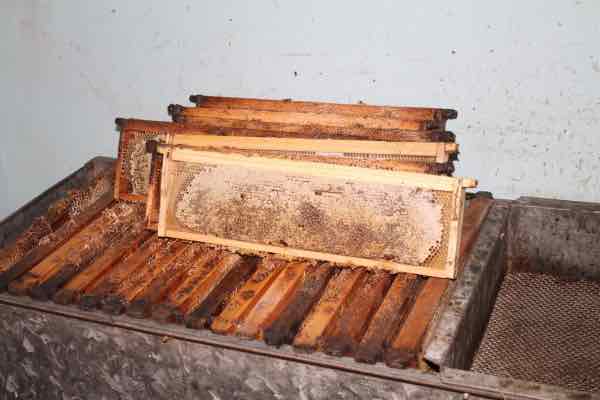

No shortcuts
Various supplement are purported from "clinical trials" to be effective in reducing weight. Researchers reporting in the journal Obesity[4], state that there was very little high-quality evidence supporting any of these claims. The industry is valued at over 6 billion dollars in 2020 in the US alone. Only 16 studies out of hundreds demonstrated significant results.
Exercise for weight loss
Exercise is beneficial in every way, bar one. It simply does not help significantly with weight loss. Researchers reporting in Current Biology[7] reporting on data from 360 studies collected over three decades found that increasing daily physical activity just does not translate into more calories burned.
Energy expenditure they found comes in two types.
- That which relates to activity (AEE).
- That which they called basal energy expenditure (BEE).
What they found is that the body compensates for increased energy expenditure from activity by decreasing BEE up to 28% for an average person. In other words, only 72pc of the extra calories burned actually translate into weight loss.
But here's the stickler; for the obese this compensation increases to 50%; only half the calories burned by exercise translates into weight loss. The body reduces its basal metabolic rate making it very difficult for those with a BMI of over 30 to lose adipose tissue by increasing their physical activity.
Professor Dugas cautions though that we should not write off the benefits of more exercise; it correlates strongly with better cardiovascular health and quality of life, but it does not contribute nearly as much as expected to weight loss.
In short the battle with obesity is won primarily at the dining-room table and not from pounding down the streets. Once again two factors stand out clearly in this struggle.
- Strongly cut out refined carbohydrates.
- Enjoy plenty of those foods that contribute to satiety as promoted by the ketogenic diets.
Then, and only then will exercise for weight loss become meaningful.
"Changing your lifestyle is the only way to manage your weight."
- Sharon Zarabi, director at Katz Institute for Women's Well-being.
Ketogenic diets
Ketogenic diets are in the main about restricting carbs; it's a massive lifestyle change. Add to that a short walk after any starchy meal; you are home and dry.
Covid-19 severity
Throwing a cat amongst the pigeons is new research published in BMJ Nutrition[5]; they followed a large group of healthcare workers from six countries. It showed that those following a plant-based diet had a 73% lower odds of moderate to severe Covid 19 severity.
And those on a low carbohydrate, high-protein diet had greater odds of moderate to severe Covid-19.
Only the Flexitarian way which is low in animal protein would qualify amongst the Ketogenic diets as promoting a lower likelihood of succumbing to Covid-19.
Newsletter
Our newsletter is entitled "create a cyan zone" at your home, preserving both yourself and Mother Earth for future generations; and the family too, of course. We promise not to spam you with daily emails promoting various products. You may get an occasional nudge to buy one of my books.
Here are the back issues.
- Lifestyle and ideal body weight
- What are ultra-processed foods?
- Investing in long-term health
- Diseases from plastic exposure
- Intensive lifestyle management for obesity has limited value
- A world largely devoid of Parkinson's Disease
- The impact of friendly bacteria in the tum on the prevention of cancer
- There's a hole in the bucket
- Everyone is talking about weight loss drugs
- Pull the sweet tooth
- If you suffer from heartburn plant a susu
- Refined maize meal and stunting
- Should agriculture and industry get priority for water and electricity?
- Nature is calling
- Mill your own flour
- Bake your own sourdough bread
- Microplastics from our water
- Alternative types of water storage
- Wear your clothes out
- Comfort foods
- Create a bee-friendly environment
- Go to bed slightly hungry
- Keep bees
- Blue zone folk are religious
- Reduce plastic waste
- Family is important
- What can go in compost?
- Grow broad beans for longevity
- Harvest and store sunshine
- Blue zone exercise
- Harvest and store your rainwater
- Create a cyan zone at your home
Did you find this page interesting? How about forwarding it to a friendly book or food junkie? Better still, a social media tick would help.
Address:
56 Groenekloof Rd,
Hilton, KZN
South Africa
Website:
https://www.bernard-preston.com